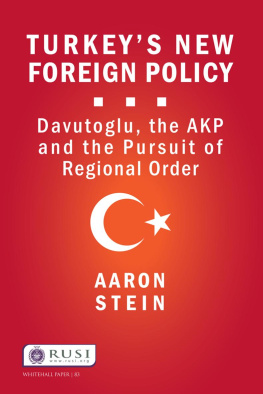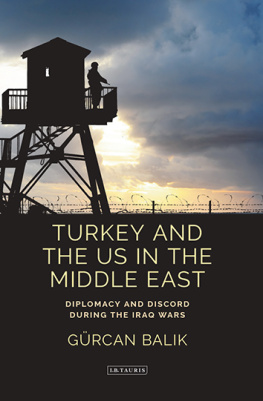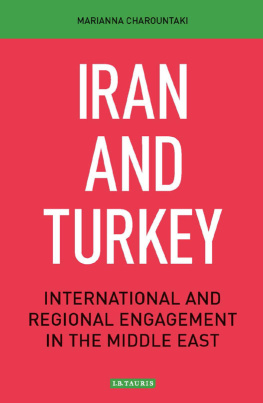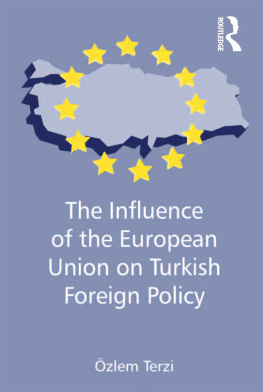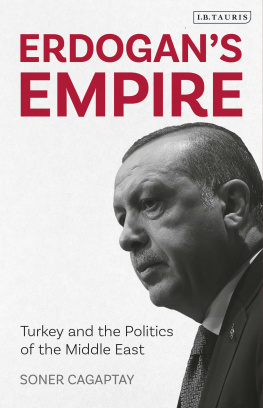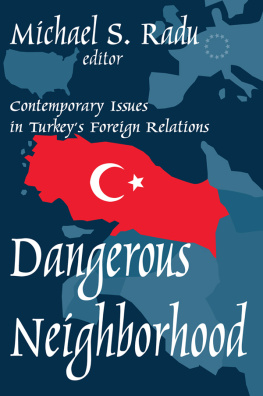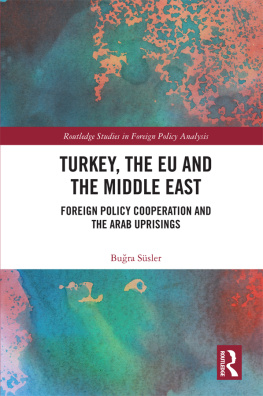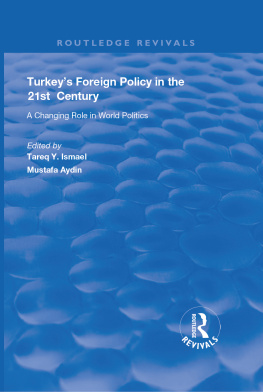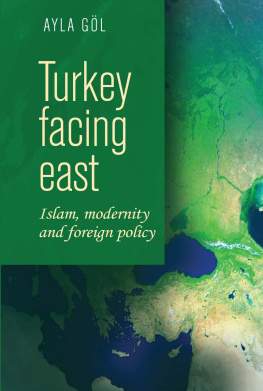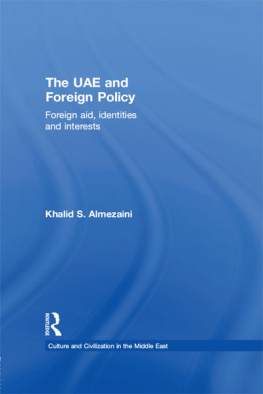Whitehall Paper 83
Turkey's New Foreign Policy
Davutoglu, the AKP and the Pursuit of Regional Order
Aaron Stein
www.rusi.org
Royal United Services Institute for Defence and Security Studies
Turkey's New Foreign Policy: Davutoglu, the AKP and the Pursuit of Regional Order
Aaron Stein
First published 2014
Whitehall Papers series
Series Editor: Professor Malcolm Chalmers
Editors: Adrian Johnson, Ashlee Godwin and Cathy Haenlein
RUSI is a Registered Charity (No. 210639)
ISBN 978-1-138-90723-2
Published on behalf of the Royal United Services Institute for Defence
and Security Studies
by
Routledge Journals, an imprint of Taylor & Francis, 4 Park Square,
Milton Park, Abingdon OX14 4RN
SUBSCRIPTIONS
Please send subscription orders to:
USA/Canada : Taylor & Francis Inc., Journals Department, 530 Walnut Street, Suite 850, Philadelphia, PA 19106, USA
UK/Rest of World : Routledge Journals, T&F Customer Services, T&F Informa UK Ltd, Sheepen Place, Colchester, Essex CO3 3LP, UK
All rights reserved. No part of this publication may be reprinted or reproduced or utilised in any form or by any electronic, mechanical, or other means, now known or hereafter invented, including photocopying and recording, or in any information storage or retrieval system, without permission in writing from the publisher.
Contents
I. Introduction: The Search for Strategic Depth The AKP
and the Middle East |
Aaron Stein is an Associate Fellow of RUSI and a PhD Candidate at Kings College London, where he is researching Iranian and Turkish nuclear decision-making. He holds a BA in Political Science from the University of San Francisco and a Masters degree in International Policy Studies with a specialisation in nuclear non-proliferation from the Monterey Institute of International Studies.
He has written extensively on Turkish politics and regional proliferation, publishing in scholarly journals and print media, including Survival , the RUSI Journal , the New York Times, Foreign Affairs, Foreign Policy , the Bulletin of Atomic Scientists and the National Interest .
I am extremely grateful to all those who supported me in the writing of this Whitehall Paper. I began my research while living in Turkey and benefited extensively from conversation with academics, former government officials and other policy analysts about Turkish foreign policy. These conversations provided the essential foundations of this work.
I would particularly like to thank Jonathan Eyal, who first approached me about writing for RUSI in November 2011 and has since become a mentor. Along the way, Behlul Ozkan, Hugh Pope, Henri Barkey and Michael Stephens were particularly forthcoming with their time and expertise. Shashank Joshi and Dov Friedman were similarly helpful and provided advice and comments at numerous different stages of this project. Malcolm Chalmers was also exceptionally generous and the paper benefited considerably from his insightful comments on each draft. The paper was helped tremendously by the patient and expert editing of Adrian Johnson, Ashlee Godwin, Cathy Haenlein and Amitha Rajan. Without their efforts, the final product would have been of lesser quality and much more difficult to read.
Many other individuals provided feedback, whether in writing or in conversation. Some of these wish to remain anonymous, but I would particularly like to thank Daniel Dombey, Steven A Cook, Michael Koplow, Hassan Hassan, Mary Fitzgerald and Charles Lister. I am also grateful to others who commented on a draft at a workshop held at RUSI in August 2014; this indispensable feedback enabled me to truly focus my thoughts in writing this paper. Finally, I would like to thank my wife, Seda Savas-Stein, and my family, David, Karol and Matt.
Any errors or shortcomings are, of course, mine alone.
Since coming to power in 2002, Turkeys Justice and Development Party (AKP) has sought to play a larger diplomatic role in the Middle East, which had suffered years of neglect by previous governments.
The AKP evolved from Turkey's Islamist political movement, the first iteration of which had begun in 1970, after Necmettin Erbakan established the Milli Nizam Partisi (National Order Party). Over the following years, this movement advocated for closer links to Turkey's Muslim-majority neighbours, and was hampered by frequent party closures in the wake of military coups or as a result of an order by the Constitutional Court.
In the November 2002 election, however, the AKP won 34.2 per cent of the national vote. Although it had emerged as Turkey's most popular party, the AKP nevertheless had to contend with the very real threat of another 'post-modern' coup until 2008, when it survived a closure case put forward by secular elements in Turkey's bureaucracy by one vote.
The AKP emerged from this closure case with its popularity far exceeding that of its closest competitor, the Kemalist Republican People's Party (CHP). The Turkish electorate's support for the AKP was in part simply a reflection of the country's conservative political majority. However, between 2002 and 2010, a large segment of Turkish liberals were also attracted to the AKP and its liberal rhetoric and democratic reforms. These factors gave the AKP a more solid electoral mandate to push forward with its own agenda, free from the bureaucratic restraints that had stifled it before the 2008 closure case.
Capitalising on this greater sense of political freedom, from 2009 the party's approach to foreign affairs began to change considerably, with Ahmet Davutoglu a former professor of international relations who is now the Turkish prime minister assuming the position of foreign minister in May of that year. Thus, while the AKPs ideology has remained consistent during its time in power, it was only gradually realised as the party's power grew.
Ankara has historically paid close attention to regional developments. However, Turkeys foreign policy in the region since its foundation as a separate state in 1923 was defined by its preference for non-intervention and neutrality in the areas which, until the First World War, had formed part of the Istanbul-centred Ottoman Empire. The AKP government has rejected this approach, choosing instead to adopt a proactive foreign policy aimed at creating 'strategic depth' by expanding Turkey's zone of influence in the Middle East, drawing on the opportunities of geography, economic power and imperial history to reconnect the country with its historical hinterland. Unsurprisingly, this approach has garnered considerable interest from scholars.
This policy is based on the work of Ahmet Davutoglu and it is rooted in the belief that the Eurasian landmass, and the areas that surround it, are of crucial importance to global geopolitics. As such, Turkey, which sits at the centre of this vital piece of land, is deemed to have a unique opportunity to expand its influence and create strategic depth. In doing so, it is held, it can establish itself as a global power and thereby play a significant role in creating new global institutions that are more in keeping with the world's different 'civilisations' or cultures. Thus, breaking from past approaches to foreign policy, this interpretation of geopolitics is based on an assumption that the spread of Western power into the Balkans, Central Asia and the Middle East is incongruent with Turkish national interests and must be reversed.

